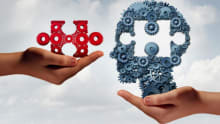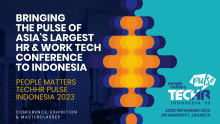Transformation amidst uncertainty

These are uncertain times. And as we learn and understand the impact of COVID--19 and its implications on workplaces and practices, much of the focus remains on business continuity plans and careful people management. Throughout the pandemic, the human resources (HR) department across companies have proved to be the backbones of the businesses, showing crucial support as a strategic partner and an agile supporter to the management and the workforce at large.
The need of the hour
Because of the changed situation due to the pandemic, there is a need to put in place new systems, policies and procedures for remote working and work-from-home practices.
The change also demands that employees have the access to technology to work remotely as well as has a well-placed system that ensures effective communication, employee engagement, collaboration, and doesn’t hinder employee productivity. As a result, hybrid ways of working are being adopted to achieve our organizational goals, ensuring the health and safety of the workforce as well as strengthening the performance of the workforce.
Though the transition from the earlier conventional approach to digitalized hybrid work culture had started much before, the pandemic amplified the need for it and accelerated it. At the same time, it prompted HR from being responsive to being proactive and resilient.
With rapid adoption and implementation of processes aligned to changing conditions, global leading companies have been performing consistently, achieving good results, even in these times. This implementation has been successful due to the synergy between their cross-functional teams and strategic leadership. And amidst the framework, HR continues to function as a catalyst.
What is required?
Leaders need to reflect trust, understanding, respect, reliability, and integrity to trigger motivation in their staff and peer groups in these turbulent times. Resonating the same, in-line managers should be encouraged to conduct regular online meetings with their team members to build deeper and more meaningful relationships. These authentic interactions could promote enthusiasm and eliminate uncertainty thus creating an environment wherein the team can take on greater responsibility and can efficiently adapt to a new format of working.
The learning
Maintaining the optimum balance with trust and transparency from both management as well as employees is quintessential in sharing the accountability. Companies continue to work closely with their stakeholders, taking collaborative decisions on various countermeasures and share clear communication with the employees.
Transforming businesses from the conventional ways of working calls for continuous digital transformation. It ensures that employees can perform seamlessly. The pandemic opened a plethora of new ways of digital working. IT plays a significant role in ensuring that the digital infrastructural capabilities are leveraged in the best possible ways, and employees are also trained regarding their usage from time to time. Frequent communication, 24-hour assistance by IT has successfully transitioned the front-end workforce and client-facing teams to the new ways of working.
Throughout the pandemic, the primary area of focus of HR has been the health and wellbeing of the employees. Months of lockdown and isolation has affected the mental and physical wellbeing of people. The pandemic reasserted that meeting Maslow’s Pyramid of Needs that begins with physiological and psychological safety is indeed of paramount importance.
What is happening at some of the leading companies?
The primary responsibility of HR is to ensure that employees feel secure, engaged, and motivated. Several companies have initiated wellness and motivational sessions for the workforce. Various companies are conducting ‘Employee Wellbeing Surveys’ during the pandemic to find gaps and then implement a detailed action plan to tackle the challenges. These include introducing various initiatives like family-inclusive contests, talent shows, a virtual wall of gratitude, etc. These have been well received by the workforce. Some others have been conducting virtual fitness, stress management sessions by experts.
Communication relating to tips on maintaining a healthy lifestyle, motivational mailers, and frequent leadership communication are being run regularly.
The other aspect is learning and development. Human Resources departments have also encouraged employees to learn new skills, enhance their competency proficiency levels and boost their careers through various developmental efforts.
These sessions have focused not only on technical skills but also on achieving the behavioural competencies that are the supreme bedrock of resilient business operations. This would help in building an internal pipeline of the talent pool.
In this light, to maintain diversity and inclusion within the work practices, a well-structured, transparent, and fair hiring processes in adherence to compliance throughout the talent life cycle and performance management could be followed.
Performance management too has evolved in a way that not only considers conventional metrics but also outlines the assessment of critical behaviours like empathy, agility, collaboration and innovation, etc. and their proficiencies against different management levels. For the achievement of long-term business goals, the future sees a need to restructure, achieve cost optimization, and recalibrate the compensation structure that is performance-driven, variable, and attractive.
The role of HR has undergone tremendous transformation where HR and business leaders are now on the frontline to motivate employees. The major areas that shall gain traction in future will continue to be the mental and physical wellbeing of employees, implementation of new initiatives and strategic planning in rapidly changing business scenarios. Agility, change management, resilience, and empathy will continue to become an inseparable part of all strategic functions.
















